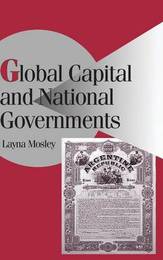
|
Global Capital and National Governments
Hardback
Main Details
| Title |
Global Capital and National Governments
|
| Authors and Contributors |
By (author) Layna Mosley
|
| Series | Cambridge Studies in Comparative Politics |
|---|
| Physical Properties |
| Format:Hardback | | Pages:402 | | Dimensions(mm): Height 229,Width 152 |
|
| Category/Genre | Political economy
Finance |
|---|
| ISBN/Barcode |
9780521815215
|
| Classifications | Dewey:332.041 |
|---|
| Audience | | Tertiary Education (US: College) | | Professional & Vocational | |
|---|
| Illustrations |
40 Tables, unspecified; 25 Line drawings, unspecified
|
|
Publishing Details |
| Publisher |
Cambridge University Press
|
| Imprint |
Cambridge University Press
|
| Publication Date |
3 February 2003 |
| Publication Country |
United Kingdom
|
Description
Global Capital and National Governments suggests that international financial integration does not mean the end of social democratic welfare policies. Capital market openness allows participants to react swiftly and severely to government policy; but in the developed world, capital market participants consider only a few government policies when making decisions. Governments that conform to capital market pressures in macroeconomic areas remain relatively unconstrained in supply-side and micro-economic policy areas. Therefore, despite financial globalization, cross-national policy divergence among advanced democracies remains likely. Still, in the developing world, the influence of financial markets on government policy autonomy is more pronounced. The risk of default renders market participants willing to consider a range of government policies in investment decisions. This inference, however, must be tempered with awareness that governments retain choice. As evidence for its conclusions, Global Capital and National Governments draws on interviews with fund managers, quantitative analyses, and archival investment banking materials.
Author Biography
I am Assistant Professor in the Department of Political Science at the University of North Carolina. From 1999 to 2004, I was a member of faculty at the University of Notre Dame.
Reviews'The book is a very interesting empirical case-study ... well structured ... offers a rare and highly relevant insight into the thinking and judgments of institutional investors ... Mosley offers considerable empirical depth and goes beyond the generalizations often employed in other studies within the wider discourse of how globalization has affected national policy autonomy. She offers an important contribution to the growing literature on how domestic economies interact with the wider global economy and how these two arenas influence each other at different points in time.' International Affairs
|